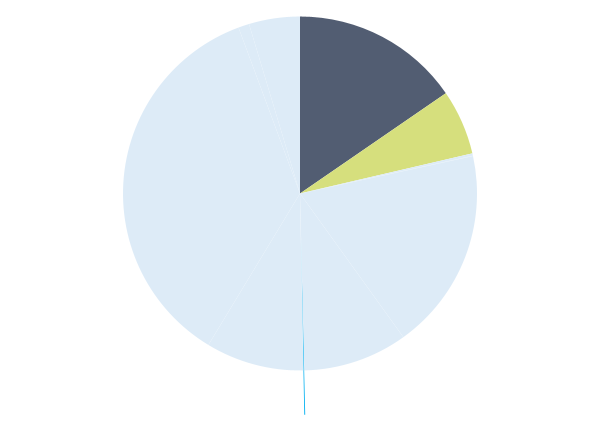ICT and Waste
ICT
 ICT accounts for over 30% of our total carbon footprint. Over the past year, the ICT team have been working on energy consumption dashboards and looking at procurement and contracts.
ICT accounts for over 30% of our total carbon footprint. Over the past year, the ICT team have been working on energy consumption dashboards and looking at procurement and contracts.
Read more about our carbon footprint breakdown in our Annex.
ICT
2022–23 achievements
Energy consumption dashboards
This year, the Digital Campus team have been working to understand the energy consumption across the university estate.
The Digital Campus team have developed reports to show total energy use across the university estate, then broken down by building, faculty, and department. This has shown trends over time, consumption averages from multiple measurements, provided league tables per faculty, department, building and can show users the nuance of building space and consumption impacts (lab, office, lecture theatre etc.), which is a first for the university.
Procurement / contracts
ICT recently completed a contract renewal, which considered sustainability, for the supply of End User Computing (EUC) devices such as laptops and desktops from HP.
These considerations included:
- Device delivery once ordered.
- Device delivery through HP (Imperial’s preferred partner for EUC) has been improved under the new contract. Here we have ensured that device deliveries are palletised where possible, without associated packaging usually associated with PC / Mac orders. The packaging that does come with the pallet (usually plastic wrap and cardboard surrounds) is taken away by the lorry and recycled appropriately.
- Leveraging HP sustainability and renewable processes.
- HP have built environmental considerations into their processes including in manufacturing. One particular point of interest is in the construction of laptop devices using waste material from ocean plastics. The HP Dragon Fly has a chassis made from this material, whilst other models have internal components made from the same material.
- Buying lower powered devices.
- Using lower powered devices reduces the amount of electricity they use day to day whilst delivering modern performance. Previously, ICT bought top of the range processors with no real consideration for the overall impact. Reducing the power of the processor to the next level down provides a device that is more than adequate for most use cases with a reduced power requirement. Where a higher-powered device is required through a justification, one can be provided.
- Recycling
- ICT has an agreement with a third-party supplier (Stone) to recycle old computers, ensuring that parts that can be reused are stored and other components are disposed of responsibly (this also guarantees secure disposal of storage devices).
- When requested, we are giving away old devices that still function for charitable purposes. This contributes to the reduction of supply chain usage where an organisation would otherwise buy new computers.
Forward look for 2024
Consumption dashboards
- Developing further on the work done this year to show the energy use at university, Faculty, Department and Building level, in the future, ICT are working towards building similar consumption reports to show heat, gas, water, etc.
- Currently the reports only show electric consumption across the 60 main buildings, over time, we hope to have data for all buildings.
- Further work is currently underway to create a Scope 3 emissions report using purchasing data. This work will be underpinned by a PhD project by PhD student Yasmine Baghdadi. The logic currently sits in Excel, and we intend to move this to PowerBI and automate the process.
Reduction in power consumption
- Baseline the current client computer estate to understand our current position on energy use and the impact it has on building environment through heat generation.
- Begin the process of switching off devices during idle periods to ensure energy isn’t wasted. This will follow a period of consultation with colleagues to ensure work isn’t interrupted in specific areas. There are at least 5,000 devices involved in this and once scaled up, would represent a significant saving.
- Follow up later in the year with another check on power usage to measure any increase or decrease based on change activities.
Deliveries
- Working with internal colleagues and external suppliers to understand whether delivery consolidation can happen, reducing the number of delivery vans coming to campus with goods.
Waste and recycling
 Over the past year, our Waste and Recycling team have introduced trial schemes and have begun working on developing SMART targets for the next few years.
Over the past year, our Waste and Recycling team have introduced trial schemes and have begun working on developing SMART targets for the next few years.
Waste and recycling
2022–23 achievements
 In July 2023, the Waste and Recycling team supported student departures from Halls of Residence. The team collected a record 2.1 tonnes of food donations for the Felix Project, a London-based foodbank, as part of their scheme in student kitchens. The British Heart Foundation received clothes donations and for the first time we worked with Better Reuse, who take used bedding, pillows and similar, which would otherwise go to landfill.
In July 2023, the Waste and Recycling team supported student departures from Halls of Residence. The team collected a record 2.1 tonnes of food donations for the Felix Project, a London-based foodbank, as part of their scheme in student kitchens. The British Heart Foundation received clothes donations and for the first time we worked with Better Reuse, who take used bedding, pillows and similar, which would otherwise go to landfill.
The team have run a number of trial schemes this year, with plans to roll out further in the future, such as:
- recycling non-contaminated disposable gloves
- Purex Water (a destabilised water which traps dirt to become stable). This has enabled some cleaning without the use of chemical products. Created on site, it reduces deliveries and packaging, and reduces cleaning operatives’ exposure to chemicals.
Warp-It gets the best value out of waste resources from large organisations, by finding owners for items that would otherwise have to be disposed of. Imperial’s stats from Warp-It to date are CO2 saved 140,383 kg, cars off the road 61, waste avoided 38,187 kg, trees equivalent 192, and total savings £295,036.
The minor works team are supporting reuse, recycling, and carbon reductions within their projects. Furniture and fittings are regularly repurposed and reused between campuses. For example, Stadium House at White City was the new home for around 55 furniture items from Sherfield Building, South Kensington. When furniture is beyond use, components are recycled by approved contractors.
Key takeaways from the all-staff survey were calls for:
(1) visible upstream waste reduction
(2) better recycling / segregation information and practice
Our commitments
Our commitments:
- Reduce annual total waste sent to landfill.
- Reduce annual emissions from waste-related activity.
- Increase annual percentage of waste recycled & reused.
- All major waste streams recycled and working towards 70% recycling rate by 2030.
SMART target 2025 – 2026
- New waste infrastructure in place to deliver improved recycling rates.
- On target with investments underway.
Forward look to 2024
The team will:
- Review all waste and recycling posters and redesign in a more user-friendly way. Separate posters will be produced for residences, catering outlets, and offices to try and increase recycling rates and reduce the amount of waste disposed as general waste.
- Improve recycling through new, more easily identifiable indoor and outdoor bins across campuses.
- Review all communication and user guides relating to Warp-It to try and increase the amount of reuse at Imperial, particularly furniture.
- Review SMART targets in 2024, to implement measurable reductions using the 2022–23 waste data.


